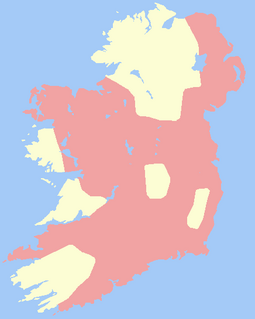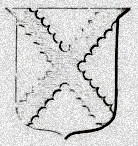Related Research Articles
The title of Earl of Cornwall was created several times in the Peerage of England before 1337, when it was superseded by the title Duke of Cornwall, which became attached to heirs-apparent to the throne.

Roger Northburgh was a cleric, administrator and politician who was Bishop of Coventry and Lichfield from 1321 until his death. His was a stormy career as he was inevitably involved in many of the conflicts of his time: military, dynastic and ecclesiastical.

The Bruce campaign was a three-year military campaign in Ireland by Edward Bruce, brother of the Scottish king Robert the Bruce. It lasted from his landing at Larne in 1315 to his defeat and death in 1318 at the Battle of Faughart in County Louth. It was part of the First War of Scottish Independence and the conflict between the Irish and the Anglo-Normans.

John of Gravina, Count of Gravina 1315–1336, Prince of Achaea 1318-1332, Duke of Durazzo 1332–1336 and ruler of the Kingdom of Albania, was a younger son of Charles II of Naples and Maria of Hungary.
Events from the 1310s in England.

Simon of Ghent was a medieval Bishop of Salisbury in England.

Roger Martival was a medieval Bishop of Salisbury in England.

Nicholas de Balmyle, also called Nicholas of St Andrews, was a Scottish administrator and prelate in the late 13th century and early 14th century. A graduate of an unknown university, he served his earliest years as a clergyman at St Andrews, moving on to hold churches in Lothian as well as deputising to two archdeacons of Lothian.
The Archdeacon of Exeter is a senior ecclesiastical officer of the Diocese of Exeter in the Church of England. The modern diocese is divided into four archdeaconries: the archdeacon of Exeter supervises clergy and buildings within the area of the Archdeaconry of Exeter.
George Carew (1497/98–1583) was an English churchman who became Dean of Exeter.
The Ottoman Military College or Imperial Military Staff College or Ottoman Army War College, was a two-year military staff college of the Ottoman Empire. It was located in Constantinople. Its mission was to educate staff officers for the Ottoman Army.
The Archdeaconry of Barnstaple or Barum is one of the oldest archdeaconries in England. It is an administrative division of the Diocese of Exeter in the Church of England.
The Archdeacon of Totnes or Totton is the senior ecclesiastical officer in charge of one of the oldest archdeaconries in England. It is an administrative division of the Church of England Diocese of Exeter and under the oversight of the Bishop suffragan of Plymouth.
Robert Rygge DD was an English medieval churchman, college fellow, and university Chancellor, and archdeacon of Barnstaple in Devon.
Roger Keys or Keyes was an English churchman and academic, Warden of All Souls' College, Oxford from 1442 to 1445.
Lewis Stephens was Archdeacon of Barnstaple and Archdeacon of Chester.
The Battle of Moiry Pass was a military engagement between a Scots-Irish army commanded by Edward Bruce, brother of Robert Bruce, king of Scotland and a Hiberno-Norman force. It was a battle of the First War of Scottish Independence and more precisely the Irish Bruce Wars. Edward Bruce attacked a garrison of soldiers from the Lordship of Ireland, as part of his attempt to revive the High Kingship of Ireland. Bruce considered the battle a great success but his campaign would ultimately fail.
Events from the year 1315 in the Kingdom of Scotland.
References
| Church of England titles | ||
|---|---|---|
| Preceded by William Fitsrogo | Archdeacon of Barnstaple 1315–1318 | Succeeded by Walter Giffard |
| Preceded by Richard de Coleton | Archdeacon of Exeter 2 February 1318 –11 June 1318 | Succeeded by Thomas de Hereward |
| This article about a Church of England archdeacon in the Province of Canterbury is a stub. You can help Wikipedia by expanding it. |